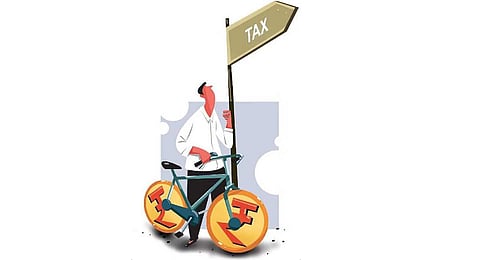

MUMBAI: With the deadline to file Income Tax Returns (ITR) ending on Monday, the country has witnessed a rush of taxpayers to file returns in the last few days. This year, the number of taxpayers missing the deadline to file ITRs is likely to be higher. With heavy rains and floods wreaking havoc in many parts of the country, many taxpayers will be unable to file ITRs before July 31. However, the returns can be filed even after the deadline, but taxpayers will have to pay the penalty.
Many taxpayers may miss ITR deadline
A recent survey has shown that over 14% of individual income taxpayers will be unable to meet the July 31 deadline for filing income tax returns. A survey conducted by LocalCircles found that individual taxpayers in flood-affected states, including Maharashtra, Telangana, Gujarat, Uttarakhand, Himachal Pradesh, and Delhi NCR, have been unable to file their income tax returns due to extreme weather conditions. The survey conducted by the community-based social media platform was based on over 12,000 responses from citizens located in 315 districts across the country.
There have been calls to extend the deadline but the government seems reluctant to give any relief to taxpayers in this regard. The Income Tax Department on Friday said that over 5.03 crore ITRs for income earned in 2022-23 fiscal have been filed as of July 27, out of which 88% have been verified electronically. About 5.83 crore income tax returns were filed as on July 31, 2022. This is much higher than the previous year as 4.83 crore returns were filed a year ago.
What to do if you miss the deadline
Taxpayers can file tax returns even after the deadline but they will have to pay the penalty. If the total income of an individual is not more than Rs 5 lakh, then the penalty applicable is R1,000 while the penalty for filing return after the deadline for individuals having income more than R5 lakh is R5,000. Filing late returns will make one ineligible for any special deduction.
“A taxpayer who has not filed a return at all within the due date, can also file return one by December 31, upon paying a certain fine, but without being eligible for special deduction. Where any taxpayer seeking to offer additional income (any pay additional taxes, without claiming any loss or deduction), can do so till March 2025, but upon being subjected to certain penal consequences,” S Sriram, Partner, Lakshmikumaran and Sridharan attorneys told this newspaper. “A taxpayer who has already filed a return before a due date, who finds any mistake in the return can file a revised return or an updated return, without any significant interest or penalty liability, till December 31,” he added. A person wilfully failing to furnish his tax return within the due date also faces the risk of imprisonment which may extend from three months to seven years, and a fine, said Sriram.
In addition to the late fee, any tax amount due will also incur penal interest until it is paid. “Interest shall be levied at 1% per month each for late filing of returns and for non-payment of advance tax, till the date of filing of the returns. Beyond December 31, the assessee would have the option to file updated returns only in the case if there is tax payable but additional tax of 25% is to be paid for updated returns filed till March 31, 2024 and 50% of additional tax thereafter till December 31, 2024,” Divakar Vijayasarathy, Founder and CEO, DVS Advisors, told TNIE.
“The assessing officer shall also have the option to initiate assessment under best judgement method, in the case of returns not being filed or having filed not providing further details as requested by the assessing officer. Penalties up to 50% could be levied for underreporting of income and up to 200% for misreporting of income,” he added.
Any taxpayer not filing his/her return within the due date would not be eligible to carry forward the losses. According to experts, losses can only be carried forward to future years if the return is filed by July 31, with the exception of house property losses. This helps taxpayers in reducing their tax liability from any future income. “Though the assessee can file returns after the due date of July 31, the same comes with certain consequences. The most important of the same being that the losses if any (other loss from house property) shall not be allowed to be carried forward and set off in the subsequent years,” Divakar Vijayasarathy added.
“Considering the financial impact of losses not being allowed to be carried forward, interest and penalty coupled with risk of prosecution in extreme cases, the assessees should strive to file the returns on time by taking advantage of the improved e-filing experience,” he added.